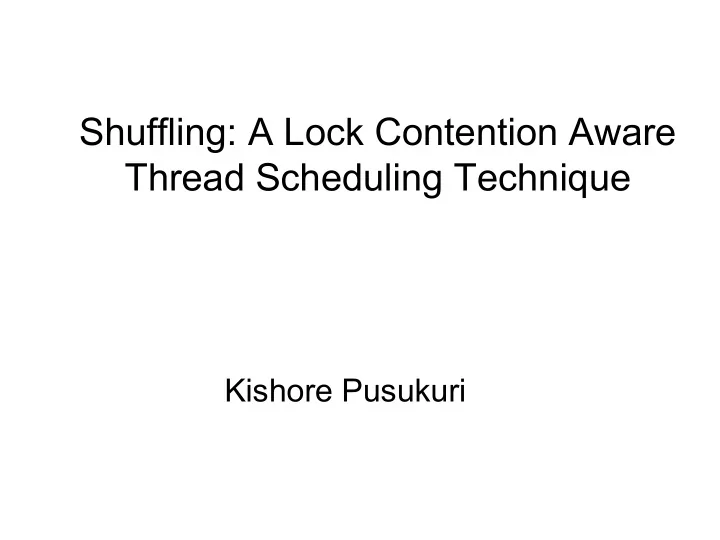

Shuffling: A Lock Contention Aware Thread Scheduling Technique Kishore Pusukuri
Multicores are Ubiquitous Deliver computing power via parallelism Potential for delivering high performance for multithreaded applications Mobile phones Oracle SPARC M7-8 2
Complexity of Achieving High Performance Operating System Policies Application Characteristics Thread Scheduling Degree of Parallelism Memory Management Lock Contention Memory Requirements Architecture Cache Hierarchy Cross-chip Interconnect Protocols 3
Modern Operating Systems Improve System Utilization and Provide Fairness Thread Scheduling: Time Share → Fairness Memory Allocation: Next → Data Locality Do not consider relationships between threads of a multithreaded application Application characteristics should be considered 4
OS Load Balancing vs Lock Contention • OS load balancing is oblivious of lock contention • Performance of multithreaded program with high lock contention is sensitive to the distribution of threads across sockets • Inappropriate distribution of threads → increases frequency of lock transfers • Increases lock acquisition latencies • Increases LLC misses in the critical path 5
Outline Introduction Motivation Shuffling Framework Experimental Results 6
Lock Contention Study Lock contention is an important performance limiting factor 23 programs (pthreads) - SPEC JBB2005 - PARSEC - SPEC OMP2001 - SPLASH 2x Run with 64 threads 64-core machine Four 16-core Sockets (AMD Opteron) 7
Lock Contention on Performance Lock time: the percentage of elapsed time a process spends on waiting for lock operations in user space 8
Lock Transfers Overhead of Lock Transfer: Acquire Lock T_low → Lock transfers between Execute Critical Section threads located on the same Socket Release Lock T_high → Lock transfers between threads located on different Sockets e.g.: bodytrack (BT) with 64 threads Lock Solaris Transfer T_low 31% T_high 69% 9
High Frequency of LLC misses & Its Cause BT with 64 threads Lock arrival times spread across a wide interval The likelihood of lock acquired by a thread on a different socket is very high Lock arrival times of threads per socket at the entry of a lock within a 100 ms time interval 10
Outline Introduction Motivation Shuffling Framework Experimental Results 1 1
Thread Shuffling [ PACT 2014 ] Minimize variation in lock arrival times of threads Schedule threads whose lock arrival times are clustered in a small time interval Once a thread releases the lock it is highly likely that another thread on the same Socket will successfully acquire the lock 12
Thread Shuffling (algorithm) Input: N → Number of Threads; S → Number of Sockets repeat 1. Monitor Threads – sample lock times of N threads if lock times exceed threshold then 2. Form Thread Groups – sort threads according to lock times and divide them into S groups 3. Perform Shuffling – shuffle threads to establish newly computed groups until (application terminates) 13
Shuffling Interval Impacts Lock transfers between sockets LLC misses 500 ms as a shuffling interval BT: LLC miss rate vs Shuffling interval 14
Shuffling Overhead Negligible Frequency of monitoring and shuffling Overhead is negligible ( < 1% of system time) 15
Lock Transfers: Solaris vs Shuffling BT Shuffling Shuffling Solaris Lock Solaris Transfer LLC miss rate 1.9 3.3 T_low 46% 31% Lock time 86% 72% T_high 54% 69% 16
Thread Lock Arrival-time Ranges 17
Lock contention & LLC miss rate Reduces Lock contention & LLC misses 18
Evaluating Thread Shuffling (cont.) Up to 54% Memcached: 17% Avg. 13% TATP: 28% Relative to Solaris DINO: only considers LLC misses PSets: binding a pool of threads to a pool of cores 19
Conclusions Problem: OS thread scheduling is oblivious to lock contention and fails to maximize performance of multithreaded applications on multicore multiprocessor systems Idea: Minimize variation in lock arrival times of threads Advantages: Improves performance on average 13% (max of 54%) No need to modify application source code 20
Recommend
More recommend